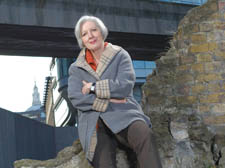|
|
 |
| |
| |
 Judith Weir: star of the BBC Symphony Orchestra’s Composer Weekend Judith Weir: star of the BBC Symphony Orchestra’s Composer Weekend |
A Weir and wonderful world
PREVIEW: JUDITH WEIR:
TELLING THE TALE
Barbican
THE annual BBC Symphony Orchestra’s Composer Weekend at the Barbican is always one of the most anticipated events in the classical calendar, and this year promises to live up to the billing with a celebration of Scottish composer Judith Weir.
Weir, who has just been awarded the Queen’s Medal for Music, takes centre stage in Telling the Tale – a programme packed with orchestral, choral and chamber music that gives an overview of the composer at the height of her creative powers.
Over the course of the weekend there will also be films, talks and family events, which include three opportunities to hear Weir talk about her inspirations, influences and outlook on life.
One of the notable highlights of the weekend is the world premiere of Weir’s Concrete, performed by the BBC Symphony Orchestra and Chorus and conducted by Martyn Brabbins.
This large-scale new work for chorus and orchestra was commissioned by the BBC for the Composer Weekend, and Weir has taken the Barbican building itself as her inspiration.
The piece, subtitled “a motet about London”, is described as “an imaginary excavation of the Barbican centre, burrowing through 2,500 years of historical rubble” and explores the notion of life amid the ruins of times past.
“I wanted to write about London – and in general about how cities rise, fall and rise again – and took the square half mile or so now covered by the Barbican estate in the City of London (and its adjacent neighbourhood) as my site,” says Weir.
“It’s the perfect place, because everything has happened to it. It was bordered by the estuary-sized Thames in prehistoric times, and has had Greek-inspired temples and a Roman wall constructed on or near it, followed by numerous medieval churches and settlements.
“It burned down several times, most notably on the night of December 29, 1940, after which rebuilding has always begun again – in our own living memory with the construction of the utopian Barbican estate.
“When you mix concrete, you take fragments of what has existed before – such as sand and gravel – and transform them into a strong material out of which you hope great things can be built. That has been my musical method and aim with CONCRETE.
“The text contains fragments from all over the [Barbican] ‘site’: invocations to Celtic river goddesses and Greek-Egyptian gods; Roman guardsmen’s songs; medieval directories of churches; contemporary accounts from street traders, firemen and architects.
“The vocal music runs parallel with John Evelyn’s 1666 (spoken) account of the Fire of London, in itself a perfect explanation of the build-admire-destroy-rebuild cycle which CONCRETE is about.”
The vast programme also includes Michael Finnissy’s Red Earth and Weir’s Moon and Star, written for the 1995 BBC Proms.
|
 |
|
 |
|
|
 |
|
 Judith Weir: star of the BBC Symphony Orchestra’s Composer Weekend
Judith Weir: star of the BBC Symphony Orchestra’s Composer Weekend






